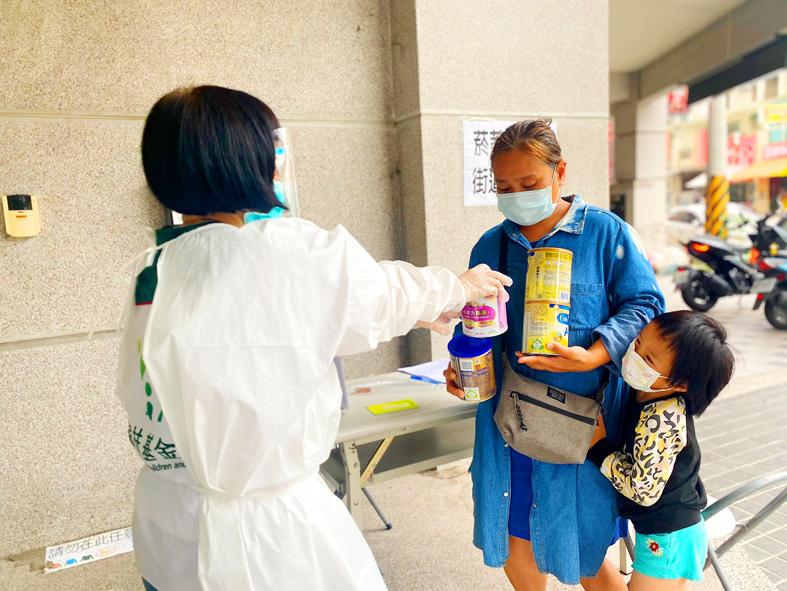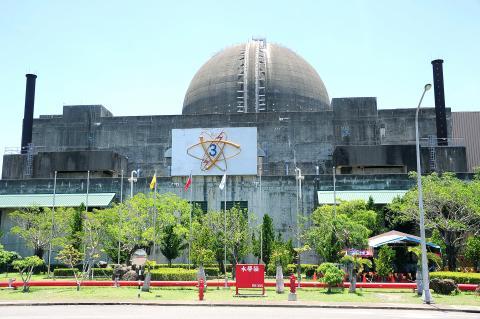Many charity organizations in Taiwan have seen donations fall by half or more since local COVID-19 cases began to spike in May, with some sending urgent calls for renewed support as virus measures ease.
During a nationwide level 3 COVID-19 alert from May 19 to Tuesday last week, in-person donations to the Taiwan Fund for Children and Families (TFCF) dropped 80 percent, TFCF Social Resources Department director Lin Hsiu-feng (林秀鳳) said.
Corporate and private donations also fell sharply, as businesses lost income and individuals suddenly encountered financial hardship, she added.

Photo courtesy of the Taiwan Fund for Children and Families
The disruptions resulted in a 45 percent decline in the fund’s donation income, while donations of supplies have entirely stopped, she said.
“Social welfare groups have all entered a cold spell,” Lin said.
Even the TFCF’s regular operations have been affected, Lin said, giving for example a case in which an aid recipient was reported by a neighbor for gathering illegally after going to the fund to collect a monthly support package.
Many service and gig workers have lost their livelihoods due to the COVID-19 pandemic, making the resources provided by welfare organizations more necessary than ever, she said.
Aside from distributing emergency funding to 2,300 households, TFCF workers call recipients at least twice a week to check on them and deliver supplies in urgent cases — even to remote mountain areas — to ensure that no one goes hungry during the pandemic, she said.
The fund helps nearly 30,000 households, 60 percent of which do not have a computer, Internet access or other equipment needed for remote education, Lin said.
Fearing they would be expected to provide compensation for any damage to borrowed school equipment, many families have pulled their children out of school or have multiple children sharing one cellphone to do schoolwork, she said.
To ensure educational equity in digital learning even after the pandemic, TFCF is calling for donations of tablets, computers and other devices, Lin added.
Meanwhile, Huashan Social Welfare Foundation representative Yang Ya-ling (楊雅苓) said that donations to the organization have halved since the local COVID-19 outbreak was first detected in May.
Receipt donations have also dropped and volunteers have stopped going to the foundation, but the most apparent loss has been donations of goods such as nutritional supplements and nonperishable food items, Yang said.
Directors of local offices have been left to replenish necessary articles and deliver pandemic supplies to elderly recipients themselves, she added.
Community care centers have been closed during the outbreak, depriving elderly people of interpersonal interaction, Yang said, adding that one person even called herself on a public phone out of desperation.
The foundation has maintained its phone conversation service to help older people retain their mental acuity, she said.
The Genesis Social Welfare Foundation said it has also been hit hard by the pandemic.
The foundation cares for more than 800 people in vegetative states by providing around-the-clock nursing care, restorative facilities, adult diapers, nutritional supplements, bill payment sercives and more, costing at least NT$4,000 per person every month, it said.
However, as people have been shopping less since the local outbreak began, receipt donations have been severely affected, resulting in lost income of more than NT$3 million, it added.

A fugitive in a suspected cosmetic surgery fraud case today returned to Taiwan from Canada, after being wanted for six years. Internet celebrity Su Chen-tuan (蘇陳端), known as Lady Nai Nai (貴婦奈奈), and her former boyfriend, plastic surgeon Paul Huang (黃博健), allegedly defrauded clients and friends of about NT$1 billion (US$30.66 million). Su was put on a wanted list in 2019 when she lived in Toronto, Canada, after failing to respond to subpoenas and arrest warrants from the Taipei District Prosecutors’ Office. Su arrived at Taiwan Taoyuan International Airport at 5am today on an EVA Air flight accompanied by a

An essay competition jointly organized by a local writing society and a publisher affiliated with the Chinese Communist Party (CCP) might have contravened the Act Governing Relations Between the People of the Taiwan Area and the Mainland Area (臺灣地區與大陸地區人民關係條例), the Mainland Affairs Council (MAC) said on Thursday. “In this case, the partner organization is clearly an agency under the CCP’s Fujian Provincial Committee,” MAC Deputy Minister and spokesperson Liang Wen-chieh (梁文傑) said at a news briefing in Taipei. “It also involves bringing Taiwanese students to China with all-expenses-paid arrangements to attend award ceremonies and camps,” Liang said. Those two “characteristics” are typically sufficient

A magnitude 5.9 earthquake that struck about 33km off the coast of Hualien City was the "main shock" in a series of quakes in the area, with aftershocks expected over the next three days, the Central Weather Administration (CWA) said yesterday. Prior to the magnitude 5.9 quake shaking most of Taiwan at 6:53pm yesterday, six other earthquakes stronger than a magnitude of 4, starting with a magnitude 5.5 quake at 6:09pm, occurred in the area. CWA Seismological Center Director Wu Chien-fu (吳健富) confirmed that the quakes were all part of the same series and that the magnitude 5.5 temblor was

Restarting the No. 2 reactor at the Ma-anshan Nuclear Power Plant would take up to 18 months, Minister of Economic Affairs J.W. Kuo (郭智輝) said today. Kuo was answering questions during a meeting of the Legislative Yuan’s Economics Committee, where legislators are considering amendments to the Renewable Energy Development Act (再生能源發展條) amid concerns about the consequences of the Pingtung County reactor’s decommissioning scheduled for May 17. Its decommissioning is to mark the end of Taiwan’s nuclear power production. However, Chinese Nationalist Party (KMT) lawmakers have proposed an amendment to the Nuclear Reactor Facilities Regulation Act (核子反應器設施管制法) that would extend the life of existing